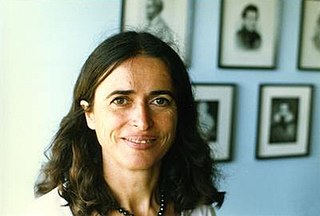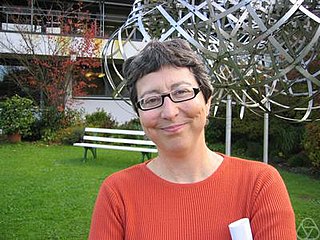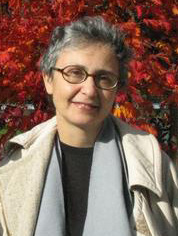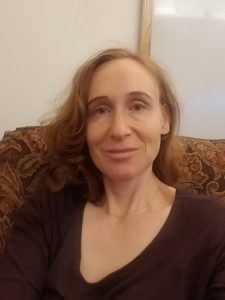
Marie Farge (born 1953) is a French mathematician and physicist who works as a director of research at CNRS, the French National Centre for Scientific Research. She is known for her research on wavelets and turbulence in fluid mechanics.

Marie Farge (born 1953) is a French mathematician and physicist who works as a director of research at CNRS, the French National Centre for Scientific Research. She is known for her research on wavelets and turbulence in fluid mechanics.
Farge earned a master's degree from Stanford University in 1977, and a third cycle doctorate in physics from Paris Diderot University in 1980. After postdoctoral studies on a Fulbright Fellowship at Harvard University, she continued her studies at Pierre and Marie Curie University, where she completed a state doctorate in 1987. [1]
She has been a researcher at CNRS since 1981. She has also held short-term positions at many other universities, including being Sofia Kovaleskaia Chair of Mathematics in 1994–95 at Kaiserslautern University. [2]
Farge was the 1993 winner of the Poncelet Prize of the French Academy of Sciences. [3] She became a member of the Academia Europaea in 2005, [4] and a fellow of the American Physical Society in 2011. [2] [5]

Claire Voisin is a French mathematician known for her work in algebraic geometry. She is a member of the French Academy of Sciences and holds the chair of algebraic geometry at the Collège de France.

Hélène Langevin-Joliot is a French nuclear physicist known for her research on nuclear reactions in French laboratories and for being the granddaughter of Marie Curie and Pierre Curie and the daughter of Irene Joliot-Curie and Frédéric Joliot-Curie, all four of whom have received Nobel Prizes, in Physics or Chemistry. Since retiring from a career in research Hélène has participated in activism centered around encouraging women and girls to participate in STEM fields. Her activism also revolves around promoting greater science literacy for the general public.
The Poncelet Prize is awarded by the French Academy of Sciences. The prize was established in 1868 by the widow of General Jean-Victor Poncelet for the advancement of the sciences. It was in the amount of 2,000 francs, mostly for the work in applied mathematics. The precise wording of the announcement by the academy varied from year to year and required the work be "in mechanics", or "for work contributing to the progress of pure or applied mathematics", or simply "in applied mathematics", and sometimes included condition that the work must be "done during the ten years preceding the award."

Marie-France Vignéras is a French mathematician. She is a Professor Emeritus of the Institut de Mathématiques de Jussieu in Paris. She is known for her proof published in 1980 of the existence of isospectral non-isometric Riemann surfaces. Such surfaces show that one cannot hear the shape of a hyperbolic drum. Another highlight of her work is the establishment of the mod-l local Langlands correspondence for GL(n) in 2000. Her current work concerns the p-adic Langlands program.
Margaret Buckingham, is a British developmental biologist working in the fields of myogenesis and cardiogenesis. She is an honorary professor at the Pasteur Institute in Paris and emeritus director in the Centre national de la recherche scientifique (CNRS). She is a member of the European Molecular Biology Organization, the Academia Europaea and the French Academy of Sciences.

Maria J. Esteban is a Spanish mathematician. In her research she studies nonlinear partial differential equations, mainly by the use of variational methods, with applications to physics and quantum chemistry. She has also worked on fluid-structure interaction.
Marta Sanz-Solé is a Catalan mathematician specializing in probability theory. She obtained her PhD in 1978 from the University of Barcelona under the supervision of David Nualart.

Jacques Émile Blamont was a French astrophysicist, author and the founder scientific and technical director of National Centre for Space Studies, known to have contributed to the development of Veronique, the first rocket launched by France in 1957. He was an elected fellow of the French Academy of Technologies and a professor emeritus of the Pierre and Marie Curie University.
Wiesława Krystyna Nizioł is a Polish mathematician, director of research at CNRS, based at Institut mathématique de Jussieu. Her research concerns arithmetic geometry, and in particular p-adic Hodge theory, Galois representations, and p-adic cohomology.

Viviane Baladi is a mathematician who works as a director of research at the Centre national de la recherche scientifique (CNRS) in France. Originally Swiss, she has become a naturalized citizen of France. Her research concerns dynamical systems.

Karine Chemla is a French historian of mathematics and sinologist who works as a director of research at the Centre national de la recherche scientifique (CNRS). She is also a senior fellow at the New York University Institute for the Study of the Ancient World. She was elected a Member of the American Philosophical Society in 2019.

Janne Blichert-Toft is a geochemist, specializing in the use of isotopes with applications in understanding planetary mantle-crust evolution, as well as the chemical composition of matter in the universe. To further this research, Blichert-Toft has developed techniques for high-precision Isotope-ratio mass spectrometry measurements.

Arlette Farge is a French historian who specialises in the study of the 18th century, a director of research at the CNRS, attached to the centre for historical research at the EHESS.

Julia Kempe is a French, German, and Israeli researcher in quantum computing. She is currently the Director of the Center for Data Science at NYU and Professor at the Courant Institute.
Marie-Lise Chanin, is a French geophysicist, aeronomist, director of research emerita at the French National Centre for Scientific Research (CNRS), and author of works on the physics of the upper and middle atmosphere.
Marie-Anne Bouchiat-Guiochon is a French experimental atomic physicist whose research has included studies of neutral currents, parity violation, and hyperpolarization. She is an honorary director of research for the French National Centre for Scientific Research (CNRS).
Elisabeth Giacobino is a French physicist specialized in laser physics, nonlinear optics, quantum optics and super-fluidity. She is one of the pioneers of quantum optics and quantum information. She graduated from Pierre and Marie Curie University and started working at the French National Centre for Scientific Research, where she has spent the majority of her professional career. She has been an invited professor at New York University and University of Auckland. She has over 230 publications and over 110 invited presentations in international conferences. She has been the coordinator of four European projects and is a member of Academia Leopoldina as well as a fellow member of the European Physical Society, the European Optical Society and the Optical Society of America.

Mena B. Lafkioui is a linguist specializing in Tamazight linguistics. She is currently Research Director at the French National Centre for Scientific Research and Full Professor of Tamazight Linguistics at the School for Advanced Studies in the Social Sciences.
Paola Inverardi is an Italian computer scientist specializing in software engineering. She is a professor in the Department of Information Engineering, Computer Science, and Mathematics at the University of L'Aquila in Italy, and the former rector of the university.
Catherine Marry is a French sociologist. Her research concerns the sociology of education, the sociology of work and gender studies. She was awarded an Irène Joliot-Curie Prize in 2008 for her mentorship activities and is a research director emeritus at the French research center, CNRS.
Le prix est décerné à Marie Farge ... pour sa contribution à l'application de la transformée par ondelettes à l'étude de la turbulence
{{citation}}: CS1 maint: untitled periodical (link).